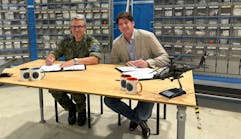Alion Awarded $64 Million Task Order for C-5M Super Galaxy Reliability, Integrity, Maintainability and Engineering for the Air Force Life Cycle Management Center
Alion Science and Technology has been awarded a $64 million task order with a 60-month period of performance for C-5M Super Galaxy Reliability, Integrity, Maintainability, and Engineering for the Air Force Life Cycle Management Center (AFLCMC)/WLS. Alion was awarded this contract under the Department of Defense Information Analysis Center's (DoD IAC) multiple-award contract (MAC) vehicle. These DoD IAC MAC task orders are awarded by the U.S. Air Force's 774th Enterprise Sourcing Squadron.
"Alion's team of leading C-5 Subject Matter Experts (SMEs) will continue to provide innovative solutions to platform and sustainment engineering challenges," said Terri Walker-Spoonhour, Alion's Senior Vice President of Operations and Acting General Manager of the Cyber and Electronic Warfare Group. "We have years of experience across the C-5 platform, including support of Aircraft Wiring and Avionics Integrity Program (AVIP), Landing Gear Integrity Program (LGIP) parts obsolescence, DMSMS resolution and high maintenance driver investigations ultimately identifying proposed solutions and risk mitigation strategies which improve aircraft availability."
C-5M Super Galaxy Division (WLS) of the Air Force Life Cycle Management Center (AFLCMC), a sub-unit of the Air Force Materiel Command (AFMC), is located at Robins Air Force Base (AFB), GA and has worldwide management and engineering responsibility for the C-5M Super Galaxy (C-5M) fleet. WLS is responsible for scheduled maintenance requirements management, fleet management, Configuration Management (CM), and technical and logistical support of the C-5M fleet of 52 aircraft. While the primary focus of this TO is to identify, address, and resolve field service revealed deficiencies of the C-5M aircraft systems, subsystems, and component parts, similar work may be performed for other weapon systems, especially where common technical issues occur, so that innovative solutions can be shared across multiple weapon systems.


